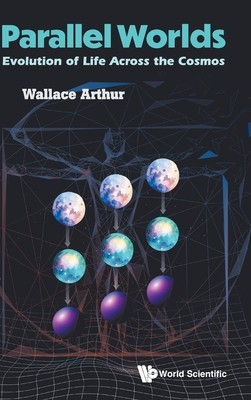
- We will send in 10–14 business days.
- Author: Wallace Arthur
- Publisher: World Scientific Publishing Company
- ISBN-10: 9811298823
- ISBN-13: 9789811298820
- Format: 15.2 x 22.9 x 1.6 cm, hardcover
- Language: English
- SAVE -10% with code: EXTRA
Parallel Worlds: Evolution of Life Across the Cosmos (e-book) (used book) | bookbook.eu
Reviews
Description
Humanity is fast approaching the point of being able to answer the age-old question: Are we alone in the cosmos? The answer will almost certainly turn out to be 'no'. This is virtually guaranteed by two discoveries made in the last hundred years or so: that the Milky Way is just one of countless galaxies; and that the number of planets beyond our solar system -- 'exoplanets' -- is vast.But what is extraterrestrial life actually like? What kinds of creatures roam the surfaces of alien planets or swim in their seas? Are they typically in the genre of 'life as we know it', or are they characterized by exotic forms and as-yet undiscovered metabolism? In Parallel Worlds, Wallace Arthur argues that we should expect to find creatures that are similar in broad terms to those of Earth. This can be anticipated because the environments of habitable planets have many parallel features, so Darwinian natural selection should work in parallel ways, producing broadly parallel trees of life.This book takes the form of a step-by-step argument in favour of the hypothesis that there are multiple worlds inhabited by life-forms that are broadly parallel to those of our home planet. Like all good hypotheses, it's testable. The testing won't be easy, and it isn't imminent; but it will happen eventually, providing humanity lasts for long enough.
EXTRA 10 % discount with code: EXTRA
The promotion ends in 19d.13:34:28
The discount code is valid when purchasing from 10 €. Discounts do not stack.
- Author: Wallace Arthur
- Publisher: World Scientific Publishing Company
- ISBN-10: 9811298823
- ISBN-13: 9789811298820
- Format: 15.2 x 22.9 x 1.6 cm, hardcover
- Language: English English
Humanity is fast approaching the point of being able to answer the age-old question: Are we alone in the cosmos? The answer will almost certainly turn out to be 'no'. This is virtually guaranteed by two discoveries made in the last hundred years or so: that the Milky Way is just one of countless galaxies; and that the number of planets beyond our solar system -- 'exoplanets' -- is vast.But what is extraterrestrial life actually like? What kinds of creatures roam the surfaces of alien planets or swim in their seas? Are they typically in the genre of 'life as we know it', or are they characterized by exotic forms and as-yet undiscovered metabolism? In Parallel Worlds, Wallace Arthur argues that we should expect to find creatures that are similar in broad terms to those of Earth. This can be anticipated because the environments of habitable planets have many parallel features, so Darwinian natural selection should work in parallel ways, producing broadly parallel trees of life.This book takes the form of a step-by-step argument in favour of the hypothesis that there are multiple worlds inhabited by life-forms that are broadly parallel to those of our home planet. Like all good hypotheses, it's testable. The testing won't be easy, and it isn't imminent; but it will happen eventually, providing humanity lasts for long enough.


Reviews